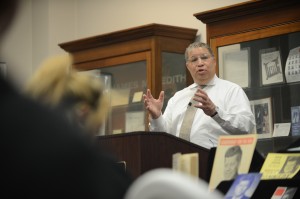
Judge Yates spoke on campus in October as part of the university's 50 years of integration commemoration.
As President John F. Kennedy prepared to lead a nation in 1961, James Meredith planned to integrate the University of Mississippi the following year. The two men would soon become inextricably linked in one of many battles for civil rights in the South.
A collection in Archives and Special Collections, donated by Cincinnati judge and Kennedy/Meredith history researcher Tyrone K. Yates, sheds light on Kennedy’s 1960 campaign.
“From my perspective, the crisis in 1962 really contained for me, two primary sets of actors,” said Yates. “One was Mr. Meredith and the persons who may have supported him, and the other was the Kennedy administration — John Kennedy and Attorney General Robert Kennedy and their principal staffs. With this collection, I wanted to reach behind and into the official versions, and see what I could discover about their characters and their personalities and those who supported them on both sides of that equation, to see if there were valuable lessons to be gleaned about how other persons can successfully face difficult situations that involved both physical courage and moral courage.”
The collection, which evolved out of Yates’ research into Meredith’s 1962 integration of UM during the Kennedy administration, includes items ranging from campaign buttons, bumper stickers and signage to a copy of Kennedy’s inaugural address signed by adviser Theodore Sorensen, who helped the president through 14 drafts of the speech. In the address, Kennedy spoke of human rights “at home and around the world.” The words “at home” — added at the recommendation of Kennedy’s civil rights advisers — spoke volumes about what would happen the following year in Oxford, Miss.
“In the collection, you can track a number of campaign brochures and positions from the Democratic Party that would have influenced Mr. Meredith’s ideas about the future of civil rights, should Kennedy be elected, as well as the actions Mr. Meredith was planning to take postelection — enroll in the University of Mississippi,” said Yates. “It is designed to complement the James Meredith papers the library already holds.”
The collection also provides a look into the 1960 campaign culture, an election in which three future presidents were on the national ticket. A portion of this collection, featuring a record of Frank Sinatra’s “High Hopes,” the song used by the Kennedy campaign, as well as pamphlets with titles such as “All Americans Move Forward: Democratic Action for Civil Rights” and “A Pledge to the Working Man: Leadership in the ’60s” is on display in the library. Yates also has donated pieces related to presidents spanning from Grover Cleveland to Barack Obama.
“There are so many wonderful items in the collection,” said Leigh McWhite, political papers archivist. “Judge Yates has demonstrated tremendous generosity in acquiring items specifically with the intent to add them to the collection, and his gifts will enable researchers to examine the material culture of American national elections.”
McWhite first met Yates in 2011, when he was on campus reviewing archival papers for a current book project on Kennedy and Meredith. Yates began his donations with a first edition of Kennedy’s Profiles in Courage, a Pulitzer Prize-winning work featuring eight senators Kennedy admired for demonstrating significant political courage under pressure. One chapter focuses on Mississippi’s own L.Q.C. Lamar, who lived in Oxford.
“Judge Yates and I were discussing potential resources available in the papers of U.S. Sen. James O. Eastland, particularly those items related to the Kennedy family,” said McWhite. “At one point in our conversation, he inquired if we possessed a first edition of John. F. Kennedy’s Profiles in Courage. When I replied that we did not own such a copy, he shipped us a first edition soon after returning home. The treasures just kept coming, and they continue to arrive.”
Yates spoke on campus in October as part of the university’s 50 years of integration commemoration. During his program “Finding JFK while Researching James Meredith at Ole Miss — A Collector’s Paradise,” he paused five times during his talk to continue donating items to the collection. Among the new pieces added that day was a copy of Fortune magazine from September 1937, featuring Kennedy’s father and several LP recordings of Kennedy’s speeches.
For more information on the collection click here or contact McWhite at slmcwhit@olemiss.edu.